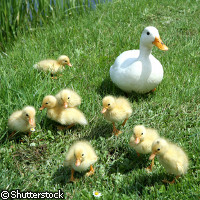Bird's eye view of the parent trap
EU-funded research led by bird biologists at the University of Bath in the UK shows that parents compensate for having a lazy partner by working harder to bring up their offspring. The research, published online in the Journal of Evolutionary Biology, analysed over 50 studies of birds to understand why and how they share their duties as parents. In nature, unlike in the human world, it is quite unusual for both parents to stay around and raise their young together. In many species, the male leaves the offspring with the mother at an early age and goes off to find another mate. But in many bird species, and in some fish and primates, including human beings, it is very common for the parents to stay together. EU support for the study came from the INCORE ('Integrating cooperation research across Europe) project, which is financed under the 'Coordination of research activities' Activity area of the Sixth Framework Programme (FP6), and the GEBACO ('Toward the genetic basis of cooperation') project, which is funded under the 'New and emerging science and technology' (NEST) budget line of FP6. Dr Freya Harrison of the University of Bath, who carried out the work in collaboration with colleagues from the University of Bristol, UK, and the University of Debrecen in Hungary, said, 'Caring for offspring is essential for their survival in many species, but it is also very costly in time and effort. Time spent bringing up your young means lost opportunities for remating and having more offspring, so parents face a trade-off between caring for current offspring and creating future offspring. 'This creates a conflict of interest between parents, since each parent would benefit by leaving their partner holding the baby while they go off and start a new brood elsewhere. This is exactly what happens in most animal species, so we wanted to understand how and why animals like birds and primates have evolved the tendency to share their parental duties.' Data from the past 30 years on parenting in birds was analysed to try to spot common parenting patterns in all species studied. The researchers found that if one parent works less hard than the other or even leaves the family, its mate works harder at bringing up the offspring, but not quite so hard as to completely compensate for the partner's laziness. Dr Harrison said, 'Some say that marriage is a state of antagonistic cooperation; in this case we found that the secret to a stable pairing was to only partially compensate for your lazy partner's failings, to make sure that they stick around.' Professor Innes Cuthill of the University of Bristol added, 'Of course, we are not claiming that fish and birds or even humans are necessarily making a consciously calculated decision. More likely there are innate rules for responding, perhaps modified through learning, that allow successful participation in joint activities without leaving room for being exploited.'
Countries
Hungary, United Kingdom



